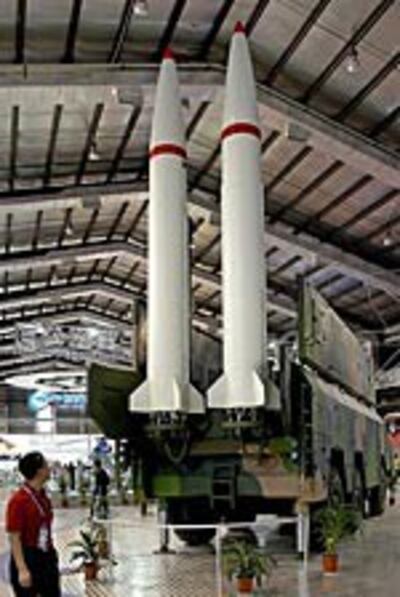
China’s secret test of an anti-satellite weapon will set back its campaign for eased access to Western technology and arms, analysts say. The incident is also seen as a blow to Beijing’s attempts to promote a more open press policy.
Last month, China’s government kept silent for 12 days after launching a ballistic missile to destroy one of its aging weather satellites on January 11. This was the first such test by any country in some 20 years.
At a regularly scheduled press briefing on January 23, Foreign Ministry spokesman Liu Jianchao confirmed only that a test had taken place, adding that it was not part of an arms race or a threat to any country, according to China’s official Xinhua news agency.
“What needs to be stressed is that China has always supported the peaceful use of space,” Liu said.
Foreign Ministry spokeswoman Jiang Yu added on January 30 that “China is opposed to an arms race in space” and would work toward a treaty to ban space weapons, Bloomberg News reported.
But four days earlier, on January 26, People’s Liberation Army (PLA) senior colonel Yao Yunzhu of China’s Academy of Military Science predicted that space would be weaponized “in our lifetime,” according to the U.S.-based analytical firm Stratfor.
In the U.S., people are going to be able to point to the launch and then the rhetoric of openness that preceded it as a sign that the Chinese are either trying to mislead us or are not being sincere about their efforts
Trade goals threatened
In interviews with Radio Free Asia, experts said that China’s anti-satellite test will hurt its efforts to persuade the United States to allow more sales of high-tech goods. Beijing has also been hoping that talks with the European Union (EU) will ease the EU arms embargo imposed after China’s 1989 crackdown on democracy demonstrators at Tiananmen Square.
Adam Segal, senior fellow for China studies at the New York-based Council on Foreign Relations, said that China’s space test will damage both of those initiatives. It will also damage China’s credibility on claims it is moving toward greater press freedoms, Segal said.
“In the U.S., people are going to be able to point to the launch and then the rhetoric of openness that preceded it as a sign that the Chinese are either trying to mislead us or are not being sincere about their efforts.”
There is now less chance than before that China will be able to build trust on security issues that could lead to a greater opening of high-tech trade, said Segal. “And it probably means that the U.S. will try to put more pressure on the European Union and other players in space who are cooperating with China,” Segal said.
“So on both those fronts, it seems as if the Chinese are going to lose out on other things that seemed really important to them before.”
Censorship ‘as strong as ever’
Press discussion of the anti-satellite test has been suppressed within China and kept off the Internet, showing that censorship is as strong as ever, Segal added.
William Reinsch, president of the National Foreign Trade Council and a member of the U.S.-China Economic and Security Review Commission, said he does not believe the test could have been conducted without the authorization of Chinese president Hu Jintao.
“It’s hard for me to imagine that anything involving the PLA is something that escapes the central government’s notice, and that anything this important escapes the central government’s notice at a high level,” Reinsch said.
Reinsch, who is also a former U.S. Commerce Department undersecretary, said that even without the satellite shootdown, the new U.S. Congress has been expected to take a more critical view of Chinese trade and security issues.
“I think we’re moving into an era where there’s going to be considerable rhetoric about China and Chinese behavior from the Congress,” said Reinsch.
Reinsch noted that China historically has not been “transparent” about its defense plans or budget. “They play these cards very close to their chest. A lot of countries do. I think we’ve spent a good bit of time and effort to try and persuade them that may not be in their best interest,” Reinsch said.
“But I don’t think the satellite issue is any different from previous behavior on their part. It continues the tradition.”
Original reporting by Michael Lelyveld. Edited for the Web by Richard Finney.
